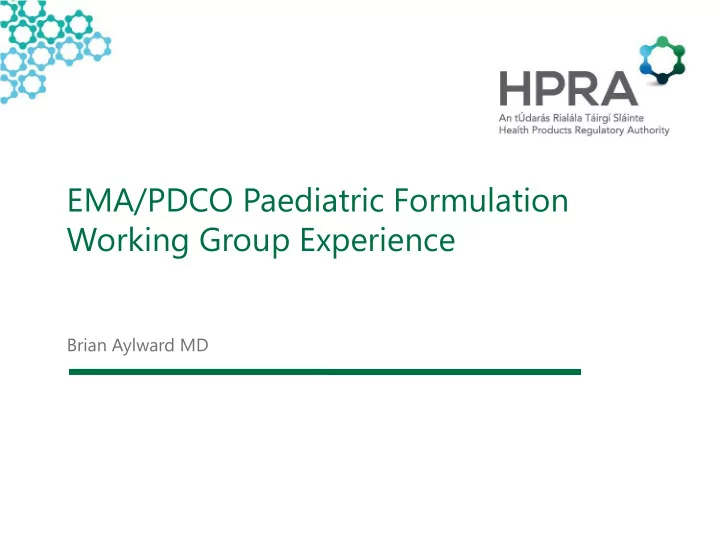

EMA/PDCO Paediatric Formulation Working Group Experience Brian Aylward MD
Disclaimer and Declaration of Interests • All opinions are my own, and cannot be considered to be the opinion of any Competent Authority or Regulatory Body • No actual or potential interests to declare 24/06/2016 2
The problem • Medicines for children have historically not been appropriately made or tested in that population • Several parallel legislative attempts to resolve this • Paediatric Regulation 1901 of 2006 • Condition in adults, similar condition in children • Paediatric Investigation Plan agreed with EMA 24/06/2016 3
Paediatric Committee - PDCO • 5 members/alternates appointed by CHMP • 1 member/alternate from other EEA States • 3 members/alternates representing HCPs • 3 members/alternates representing patients • Assessment supported by specialist Working Groups – Formulations, Non-Clinical, Modelling & Extrapolation, etc, 4
Formulations Working Group • Currently 12-15 national experts • Pharmacy (industrial, academic and clinical) • Regulatory • Clinical • Help the PDCO with the review of the formulation proposals of the applicant 24/06/2016 5
Paediatric Formulation guidelines
Paediatric Formulation guidelines
Problem #1 – Industry • Applicants to come with PIP proposals following completion of adult Phase 1 • Adult form already developed by this stage • Paediatric development seen as an add-on • Reformulation to account for paediatric needs time-consuming and costly • Reluctance / resistance • Investment vs Reward 24/06/2016 8
Problem #2 – Regulators • Specific information often lacking or inadequate, esp. in younger age cohorts • Uncertainties on how best to fill these gaps • “Precautionary Principle” vs. innovation • ? Inappropriately detailed assessment & requirements • ? Lack of confidence that formulation will ultimately be developed 24/06/2016 9
Problem #3 – Innovation • New chemical entities • New “excipients” • “Inactive” substance • Anything which is not an active substance • “Active” excipients – a contradiction? 24/06/2016 10
My hopes for this meeting • ; Earlier appreciation of a “whole life” paradigm by industry • Greater acceptance of uncertainty by regulators • Development of methods for addressing knowledge gaps 24/06/2016 11
Thank you 24/06/2016 12
Recommend
More recommend